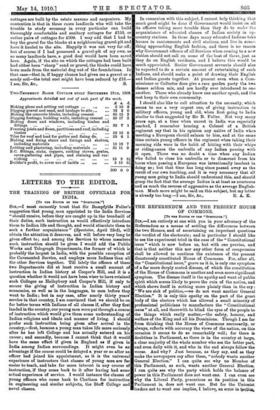LETTERS TO THE EDITOR.
THE TRAINING OF BRITISH OFFICIALS FOR INDIA.
[To THZ EDITOR OF THZ "SrmorAmos."1 SIR,—I most earnestly trust that Sir Bampfylde Fuller's suggestion that young _men appointed to the India Services "should receive, before they are caught up in the treadmill of their duties, such instruction as would effectively introduce them to Indian life and thought, and would stimulate them to seek a further acquaintance" (Spectator, April 23rd), will obtain the attention it deserves, and will before very long be given effect to; and among the Services to whose members such instruction should be given I would add the Public Works and Telegraph Departments, the former of which is probably the largest in India, with the possible exception of the Covenanted Service, and employs more Indians than all the other Services together. Till lately the officers of these two Departments did at least receive a small amount of instruction in Indian history at Cooper's Hill, and it is a question whether it would not have been wiser to have retained such Colleges as Haileybury and Cooper's Hill, if only to secure the giving of instruction in Indian history and economics, as well as in the languages, to men before they went to India ; but in any case, after nearly thirty years' service in that country, I am convinced that we should be on far better terms with Indians of all classes if, after they first landed in the country, our young men were put through a course of instruction which would give them some understanding of Indian religions and ideals and manner of living. I should prefer such instruction being given after arrival in the country,—first, because a young man takes life more seriously after he has left College and has actually entered on his career ; and secondly, because I cannot think that it would have the same effect if given in England as if given in India among Indian surroundings. It might even be an advantage if the course could be delayed a year or so after an officer had joined his appointment, as it is the universal experience of instructors that classes of young men are far easier to teach, and take far more interest in any course of instruction, if they come back to it after having had some actual experience of service. I would instance the classes of young officers who come back to Chatham for instruction in engineering and similar subjects, the Staff College and naval classes.
In connexion with this subject, I cannot help think in g that much good might be done if Government would insist on all its officers taking more trouble than they do to make tbe acquaintance of educated classes of Indian society in up- country stations. In these days many educated Indians take houses in cantonments and civil stations, and live in some- thing approaching English fashion, and there is no reason why Government officers of all Services when coming to a new station should not call on some of the best of these, just as they do on English residents, and I believe this would be much appreciated. Senior Government servants should also he expected to do a certain amount of entertaining of such Indians, and should make a point of drawing their English and Indian guests together. At present even when a Com- missioner or Collector does give a rare garden party the two classes seldom mix, and are hardly ever introduced to one another. Those who already know one another speak, and the rest keep to their own community.
I should also like to call attention to the necessity, which seems to me a very urgent one, of giving instruction to military officers, young and old, when first going to India similar to that suggested by Sir B. Fuller. Not very many years ago, at a time when unrest in India was especially marked, I remember hearing a Colonel of a British regiment say that in his opinion any native of India when meeting a European should salaam to him, and at the same time certain young officers in the regiment when taking their morning ride were in the habit of hitting with their whips or riding-canes the umbrella of any Indian passing with it open. There was no doubt a time when any Indian who failed to close his umbrella or to dismount from his horse when passing a European was intentionally insolent in doing so ; but that time has long since passed away as the result of our own teaching, and it is very necessary that all young men going to India should understand this, and should grasp the fact that the average Indian is at least as courteous and as much the reverse of aggressive as the average English- man. Much more might be said on this subject, but my letter is already too long.—I am, Sir, &c., E. A. K.






































 Previous page
Previous page